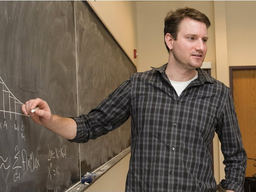Differential Equations Seminar
James Adler, Tufts University
Location
Mathematics/Psychology : 401
Date & Time
November 13, 2017, 11:00 am – 12:00 pm
Description
Title: Energy-Minimization, Finite Elements, and Multilevel Methods for Liquid Crystals
Abstract:
Liquid crystals are substances that possess mesophases with properties intermediate between liquids and crystals, existing at different temperatures or solvent concentrations. We consider two types of liquid crystals in this talk, nematic and cholesteric, which are formed by rod-like molecules that self-assemble into an ordered structure, such that the molecules tend to align along a preferred orientation. The preferred average direction at any point in a domain is known as the director and is taken to be of unit length at every point in the domain. In addition to their inherent structure, which is affected both by the self-assembly and boundary affects, most liquid crystals are responsive to electric fields and may be compelled to arrange their structure in new ways by the presence of these fields. Simulating this realignment from all of these factors is crucial for understanding many applications where such switching is useful, such as energy generators and actuators.
The main focus of this talk will be on the computational modeling of equilibrium configurations for liquid crystals influenced by elastic and electric effects. Thus, the method targets minimization of the system free energy based on the so-called Frank-Oseen free-energy model, subject to the unit-length constraint of the director. We consider an energy-minimization finite-element approach to discretize the constrained optimization problem along with Newton's method to linearize the system. We are able to show that solutions to the intermediate discretized linearizations exist generally and are unique under certain assumptions. Numerical experiments are performed for problems with a range of Frank elastic constants as well as simple and patterned boundary conditions. The resulting algorithm accurately handles heterogeneous Frank constants and efficiently resolves configurations resulting from complicated boundary conditions relevant in ongoing research. Additionally, we present techniques to handle situations in which multiple equilibrium states can arise. This involves the incorporation of multilevel and nonlinear deflation techniques to solve the resulting linear systems.
Tags:
